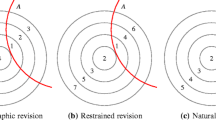Abstract
In this paper we investigate the properties of iterated multiple belief revision. We examine several typical assumptions for iterated revision operations with an ontology where an agent assigns ordinals to beliefs, representing strength or firmness of beliefs. A notion of minimal change is introduced to express the idea that if no evidence to show how a belief set should be reordered after it is revised, the changes on the ordering should be minimal. It has been shown that under the assumption of minimal change, the multiple version of Darwiche and Pearl’s postulate (C1) holds no matter in what degree new information is accepted. Moreover, under the same assumption, Boutilier’s postulate (CB) holds if and only if new information is always accepted in the lowest degree of firmness while Nayak et al.’s postulate (CN) holds if and only if new information is always accepted in the highest degree. These results provide an ontological base for analyzing the rationality of postulates of iterated belief revision.
Preview
Unable to display preview. Download preview PDF.
Similar content being viewed by others
References
Alchourrón, C.E., Gärdenfors, P., Makinson, D.: On the logic of theory change: partial meet contraction and revision functions. The Journal of Symbolic Logic 50(2), 510–530 (1985)
Boutilier, C.: Revision sequences and nested conditionals. In: Proc. 13th Int. Joint Conf. on Artificial Intelligence (IJCAI 1993), pp. 519–525 (1993)
Boutilier, C.: Iterated revision and minimal change of conditional beliefs. Journal of Philosophical Logic (25), 262–305 (1996)
Darwiche, A., Pearl, J.: On the Logic of Iterated Belief Revision. In: Proceedings of the fifth Conference on Theoretical Aspects of Reasoning about Knowledge, pp. 5–23 (1994)
Darwiche, A., Pearl, J.: On the logic of iterated belief revision. Artificial Intelligence 89, 1–29 (1997)
Friedman, N., Halpern, J.Y.: Belief revision: A critique. In: KR 1996, pp. 421–431 (1996)
Gärdenfors, P.: Knowledge in Flux: Modeling the Dynamics of Epistemic States. MIT Press, Cambridge (1988)
Gärdenfors, P.: Belief revision: an introduction. In: Gärdenfors, P. (ed.) Belief Revision, pp. 1–28. Cambridge University Press, Cambridge (1992)
Konieczny, S., Perez, R.P.: A framework for iterated revision. Journal of Applied Non-Classical Logic 10(3-4), 339–367 (2000)
Lehmann, D.: Belief revision, revised. In: Proc. 14th Int. Joint Conf. on Artificial Intelligence (IJCAI 1995), pp. 1534–1540 (1995)
Li, W.: A logical framework for evolution of specification. In: Sannella, D. (ed.) ESOP 1994. LNCS, vol. 788, pp. 394–408. Springer, Heidelberg (1994)
Lindström, S.: A semantic approach to nonmonotonic reasoning: inference operations and choice. Uppsala Prints and Preprints in Philosophy (10) (1994)
Nayak, A.: Iterated belief change based on epistemic entrenchment. Erkentnis 41, 353–390 (1994)
Nayak, A., Foo, N., Pagnucco, M., Sattar, A.: Changing conditional Beliefs unconditionally. In: TARK 1996, pp. 119–135 (1996)
Peppas, P.: Well behaved and multiple belief revision. In: Wahlster, W. (ed.) Proceedings of 12th European Conference on Artificial Intelligence (ECAI 1996), pp. 90–94 (1996)
Spohn, W.: Ordinal conditional functions: a dynamic theory of epestemic states. In: Harper, W.L., Skyrms, B. (eds.) Causation in Decision, Belief Change, and Statistics, vol. 2, pp. 105–134 (1987)
Williams, M.A.: Iterated theory base change: a computational model. In: Proc. 14th Int. Joint Conf. on Artificial Intelligence (IJCAI 1995), pp. 1541–1547 (1995)
Zhang, D.: Belief revision by sets of sentences. Journal of Computer Science and Technology 11(2), 108–125 (1996)
Zhang, D., Chen, S., Zhu, W., Chen, Z.: Representation theorems for multiple belief changes. In: Proc. 15th Int. Joint Conf. on Artificial Intelligence (IJCAI 1997), pp. 89–94 (1997)
Zhang, D., Chen, S., Zhu, W., Li, H.: Nonmonotonic reasoning and multiple belief revision. In: Pollack, M. (ed.) Proceedings of the 15th International Joint Conference on Artificail Intelligence ( IJCAI 1997), pp. 95–100. Morgan Kaufmann, San Francisco (1997)
Zhang, D., Li, W.: Open logic based on total ordered partition model. Science in China(Series E) 41(6) (1998)
Zhang, D., Foo, N.: Infinitary belief revision. Journal of Philosophical Logic 6(30), 525–574 (2001)
Zhang, D., Foo, N., Meyer, T., Kwok, R.: Negotiation as mutual belief revision. In: Proceedings of the 5thWorkshop on Nonmonotonic Reasoning, Action, and Change (NRAC 2003), IJCAI 2003 (2003)
Author information
Authors and Affiliations
Editor information
Editors and Affiliations
Rights and permissions
Copyright information
© 2003 Springer-Verlag Berlin Heidelberg
About this paper
Cite this paper
Zhang, D. (2003). Properties of Iterated Multiple Belief Revision. In: Lifschitz, V., Niemelä, I. (eds) Logic Programming and Nonmonotonic Reasoning. LPNMR 2004. Lecture Notes in Computer Science(), vol 2923. Springer, Berlin, Heidelberg. https://doi.org/10.1007/978-3-540-24609-1_27
Download citation
DOI: https://doi.org/10.1007/978-3-540-24609-1_27
Publisher Name: Springer, Berlin, Heidelberg
Print ISBN: 978-3-540-20721-4
Online ISBN: 978-3-540-24609-1
eBook Packages: Springer Book Archive




